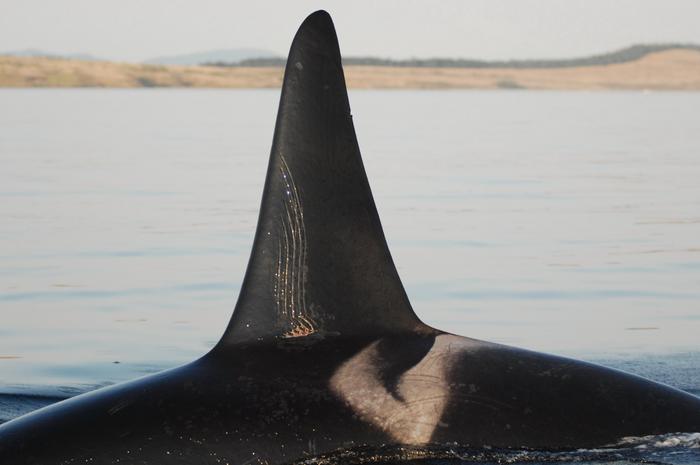Female killer whales live up to ninety years in the wild, and most live an average of twenty-two years after menopause. Scientists have long wondered why humans and some whale species spend a significant portion of their life not reproducing. Previous studies show that, even after having their last calf, killer whale mothers take care of their families by sharing the fish they catch. Now, in a study published on July 20 in the journal Current Biology, researchers note that these mothers can also provide social support to their sons by protecting them from being injured by other orcas.

Credit: COPYRIGHT David Ellifrit, Center for Whale Research
Female killer whales live up to ninety years in the wild, and most live an average of twenty-two years after menopause. Scientists have long wondered why humans and some whale species spend a significant portion of their life not reproducing. Previous studies show that, even after having their last calf, killer whale mothers take care of their families by sharing the fish they catch. Now, in a study published on July 20 in the journal Current Biology, researchers note that these mothers can also provide social support to their sons by protecting them from being injured by other orcas.
“The motivation of this project was really to try and understand how these post-reproductive females are helping their offspring,” says first author Charli Grimes, an animal-behavior scientist at the University of Exeter. “Our results highlight a new pathway by which menopause is adaptive in killer whales.”
The research team studied southern resident orcas, a group of orcas that live off the Pacific Northwest coast. These killer whales live in matriarchal social units that consist of a mother, her offspring, and the offspring of her daughters. Although male orcas will outbreed with whales from other pods, both males and females stay in their unit of birth, with their mother, for life.
Using data from the Center for Whale Research’s annual photographic census of the orca population, the researchers looked for evidence of scarring on each catalogued whale’s skin. Killer whales have no natural predators other than humans, so a tooth mark that is able to puncture an orca’s skin was most likely inflicted by another orca.
The study found that, if a given male’s mother was still alive and no longer reproducing, that male would have fewer tooth marks than his motherless peers or his peers with a mother who was still reproducing.
“It was striking to see how directed the social support was,” says senior author Darren Croft (@DarrenPCroft), an animal-behavior scientist at the University of Exeter. “If you have a post-reproductive mother who’s not your mother within the social group, there’s no benefit. It’s not that these females are performing a general policing role. These post-reproductive mothers are targeting the support they are giving to their sons.”
The researchers still can’t say for certain what kinds of social conflicts are leading to tooth marks or how older females are protecting their sons against them. They do note that post-menopause females have the lowest incidence of tooth marks in the entire social unit, suggesting that they do not physically intervene in a conflict. If older orca females play a similar role to that of older women in human societies, they might be acting as mediators, preventing conflict from occurring in the first place. To explore this further, the researchers plan on completing an additional study by using drone footage to observe whale behavior from above.
“It’s possible that with age comes advanced social knowledge. Over time, they might have a better understanding of other social groups,” says Grimes. “Given these close mother-son associations, it could also be that she is present in a situation of conflict so she can signal to her sons to avoid the risky behavior they might be participating in.”
“We’ve got hypotheses, but we need to test them by seeing what’s happening under water when these different groups interact,” says Croft. “We’ve learned so much from this population, but we’ve still got so much to learn from them.”
###
Current Biology, Grimes et al. “Postreproductive female killer whales reduce socially inflicted injuries in their male offspring” https://www.cell.com/current-biology/fulltext/S0960-9822(23)00824-2
This work was supported by the Natural Environment Research Council. The authors declare no conflicts of interest.
Current Biology (@CurrentBiology), published by Cell Press, is a bimonthly journal that features papers across all areas of biology. Current Biology strives to foster communication across fields of biology, both by publishing important findings of general interest and through highly accessible front matter for non-specialists. Visit: http://www.cell.com/current-biology. To receive Cell Press media alerts, contact [email protected].
Journal
Current Biology
DOI
10.1016/j.cub.2023.06.039
Method of Research
Observational study
Subject of Research
Animals
Article Title
Postreproductive female killer whales reduce socially inflicted injuries in their male offspring
Article Publication Date
20-Jul-2023




